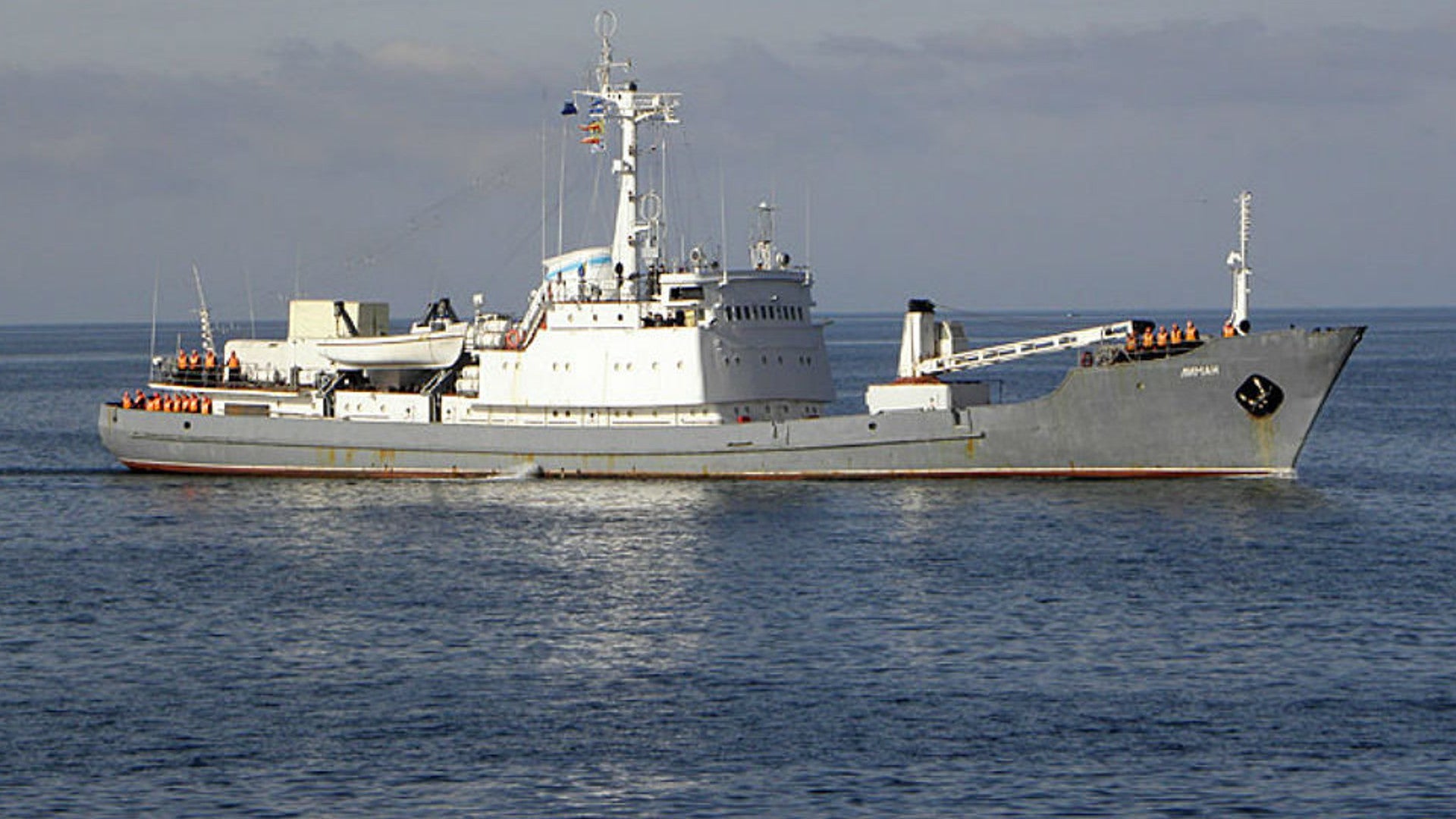A Russian spy ship has sunk after a collision with a freighter carrying sheep near Turkey’s Bosphorus strait. The accident underscores the busy nature of the strategic entry point into the Black Sea and why Russia is actively seeking military bases along the Mediterranean.
On the morning of April 27, 2017, the Russian Navy vessel Liman, officially a “research ship” assigned to the country’s Black Sea Fleet, hit another vessel off the Turkish coast and suffered a catostrophic hull breach. Dense fog in the area at the time was likely a factor. The Turkish Coast Guard rescued all 78 members of the crew.
“All of the crew members of the Black Sea Fleet’s research vessel Liman are safe and sound and are preparing for evacuation from a Turkish rescue vessel to a Russian ship,” the Russian Defense Ministry said in a statement.
Russian authorities initially identified the other ship as the “Ashot-7.” However, widespread media reports said the Togo-flagged Youzarsif-H, carrying nearly 9,000 sheep from Romania en route to Jordan, was actually the other vessel involved in the incident.

Despite its official classification, the Liman, a Project 861 Moma-class, is designed to gather intelligence above and below the waves. The ships have radars, hydro-acoustic listening gear, and other, unspecified “reconnaissance equipment,” according to RT. These sensors allow the crew to locate, track, and scoop up information about both surface ships and submarines. Before the accident, Russia had three of these Polish-built Soviet-era ships, which have a displacement of 1,560 tons, still in service.
Collisions and other accidents in and around the narrow Bosphorus are not unheard of. A major shipping route and the only way in and out of the Black Sea, civilian and military ships frequently make the passage. A list on Wikipedia describes some of more than 450 incidents, which included numerous wrecks and fatalities, which occurred between 1953 and 2002.

For the Kremlin, the route is unfortunately the only way to get from its bases along the Black Sea out into the Mediterranean and beyond. And since Moscow forcefully annexed Ukraine’s Crimea region in 2014 and began actively supporting rebel groups in that country’s eastern provinces, this strategic complexities of the arrangement have only become more pronounced for the Russian Navy.
Of the countries that sit along the Black Sea, three are NATO members – Bulgaria, Romania, and Turkey. Ukraine and Georgia both have tense relations with Russia and routinely conduct military exercises with their American counterparts. After Moscow forcefully annexed Ukraine’s Crimea region and then began supporting separatists in that country’s eastern provinces, the United States only stepped up these practice sessions. The Kremlin responded with increasing harassment and monitoring of U.S. Navy ships. In 2016, Liman itself sortied out to keep an eye on Exercise Sea Breeze along Ukraine’s Black Sea coast.
Separately, since 2012, Russia has had increasingly worrisome spats with Turkey over Moscow’s support of Syrian dictator Bashar Al Assad. While the Black and Mediterranean Seas are international bodies of water, the Bosphorus is entirely under Turkish control. An international agreement, the Montreux Convention, allows, but restricts the movement of naval vessels through the strait.
This complicated arrangement was one of the main reasons the Kremlin stood behind Assad, even as his campaign against anti-government rebels became increasingly brutal. Soviet authorities had signed a deal with Assad’s father, Hafez Al Assad, to operate a small garrison and service ships at the port of Tartus. Russia kept that base after the Soviet Union’s collapse. After rescuing the Assad regime from potential collapse, Russia has not only been basically gifted the naval base, but they have also been allowed to expand it drastically, taking over new docks that can support any vessel in the Russian fleet.
Then, in late 2015, as observers continued to spot Russian naval vessels carrying military vehicles and other equipment through the passage on their way to Syria, there were real concerns that Turkey might try to cut off Moscow’s access to the vital waterway. Had this happened, it would have caused major disruptions to Russia’s activities in Syria. The only remaining supply routes would have been a circuitous sea path from country’s northern European bases via the Strait of Gibraltar or much more limited deliveries by air. On top of that, depending on where ships like Liman were located at the time, it would have prevented ships them from responding to new operational needs or short-notice crises in or out of the Black Sea.
Of course, the two countries have improved their diplomatic relationship since then, finding common ground in the fight against Islamic State terrorists. Turkey’s prime minister, Binali Yildirim expressed “sadness” over Liman’s fate in a telephone call with his Russian counterpart, President Dmitry Medvedev, according to the Turkish Anadolu news agency.

Still, this hasn’t solved the fundamental issues and officials in Moscow have been steadily looking for additional and more reliable facilities throughout the Mediterranean. The War Zone previously deeply explored the Kremlin’s outreach in both Libya and Egypt, which has included major discussions about basing or access to facilities.
These requirements are only likely to increase as Russian forces continue operations in Syria and look poised to expand operations and cooperation into North Africa. In October 2016, the Russian Navy’s troublesome aircraft carrier
Kuznetsov already had to refuel at sea off North Africa after Malta refused to allow it into port as it headed for the Syrian coast.
The next month, the ship hosted Libyan warlord Khalifa Haftar, who appears amenable to Russian military assistance. In turn, American officials accused the Kremlin of only supporting Haftar in order to secure access to ports the rogue general controls along Libya’s eastern shores.
The loss of Liman in a simple accident can only serve to reinforce this existing desire to find additional ways to avoid the Bosphorus altogether, regardless of any diplomatic considerations.
Contact the author: joe@thedrive.com
